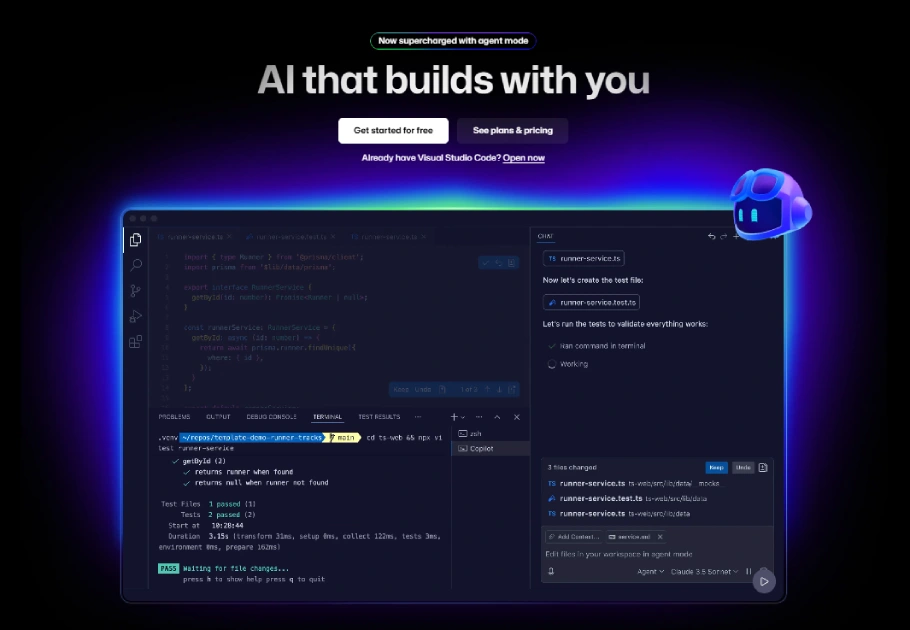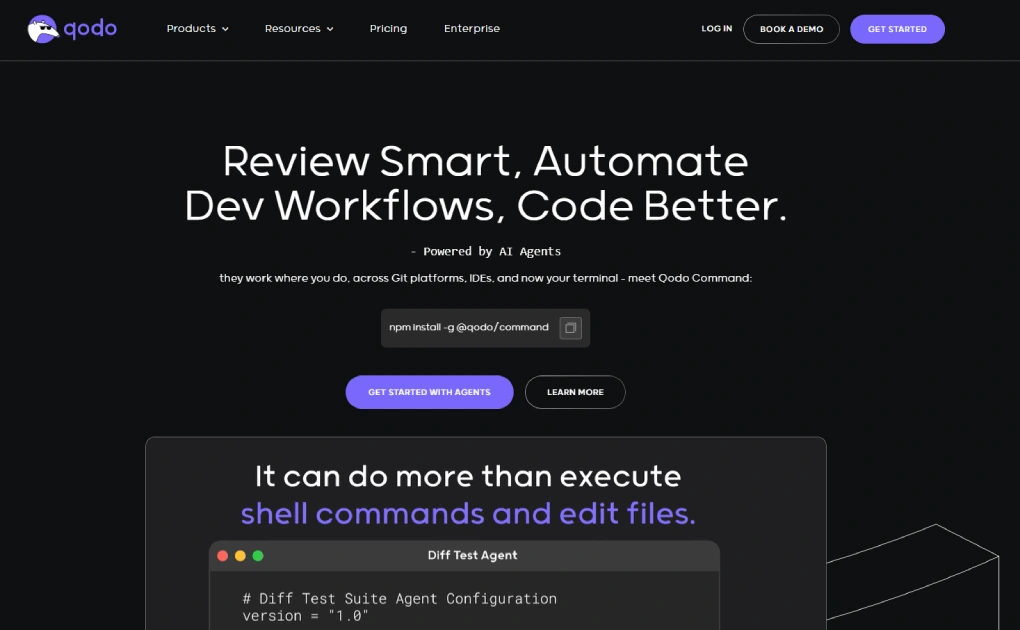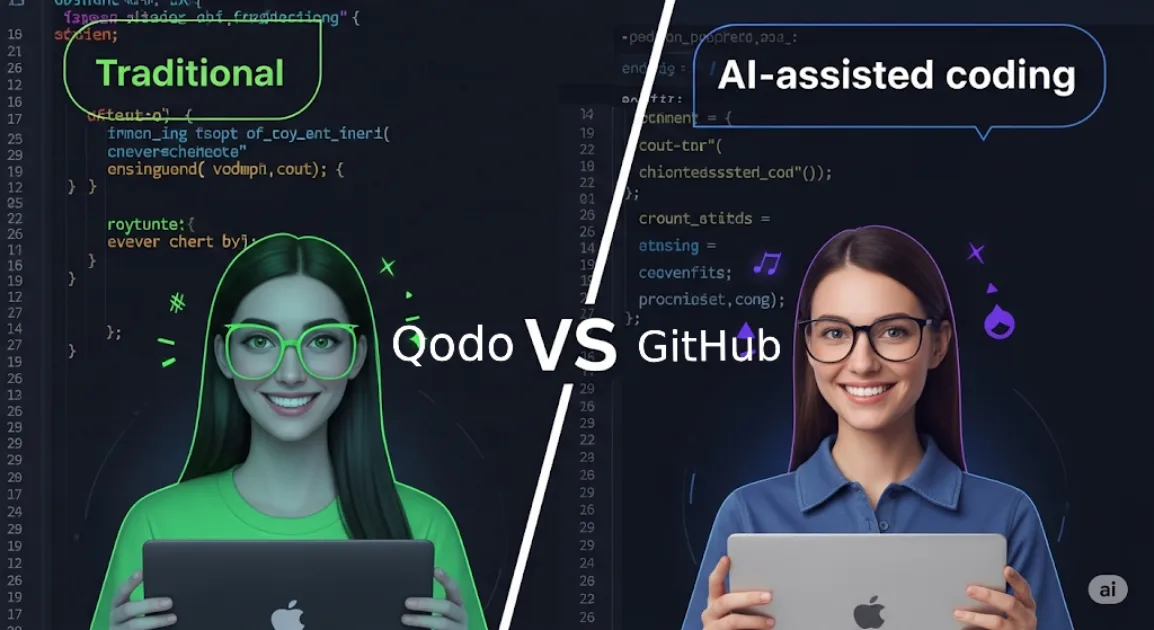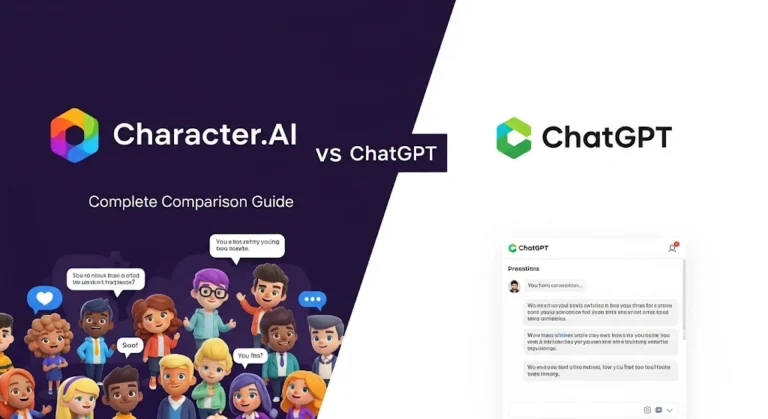AI Coding Assistants Compared: How Qodo and GitHub Copilot Are Revolutionizing Development
The software development landscape is experiencing its most significant transformation since the introduction of integrated development environments. AI coding assistants are not just changing how we write code, they’re fundamentally reshaping the entire development process, turning natural language into functional software at unprecedented speeds.
Recent data reveals that nearly 50% of all code on GitHub is now AI-generated, with projections suggesting this figure will soar to 80% by 2027. This isn’t just a trend; it’s a paradigm shift toward what industry experts call “vibe coding”, programming through intuitive prompts rather than manual syntax crafting.
But with dozens of AI coding assistants flooding the market, choosing the right tool can make or break your development productivity. Let’s dive deep into the leading platforms transforming how developers work, focusing on powerhouse solutions like Qodo and GitHub Copilot.
The Rise of AI-Powered Development
Traditional software development follows a predictable pattern: conceptualize, code, test, debug, repeat. AI coding assistants compress this cycle dramatically, enabling developers to focus on creative problem-solving rather than syntax memorization and boilerplate generation.
Key transformation metrics:
- 73% faster code completion with AI assistants
- 40% reduction in debugging time through AI-powered code review
- 60% increase in feature delivery speed for teams using AI tools
- 85% of developers report improved job satisfaction with AI assistance
This revolution extends beyond simple code generation. Modern AI assistants handle code review, automated testing, documentation generation, and even architectural recommendations, essentially becoming virtual senior developers for entire teams.
Comprehensive AI Coding Assistant Comparison
GitHub Copilot: The Industry Pioneer
GitHub Copilot, powered by OpenAI’s Codex model, established the AI coding assistant category and remains the most widely adopted solution.

Strengths:
- Exceptional language support: 50+ programming languages
- Seamless IDE integration: Native support for VS Code, JetBrains, Neovim
- Context-aware suggestions: Understands project structure and coding patterns
- Chat functionality: Interactive code explanation and debugging assistance
- Massive training dataset: Billions of lines of public code for comprehensive learning
Performance Highlights:
- Generates accurate code suggestions 37% of the time
- Reduces repetitive coding tasks by up to 55%
- Supports complex multi-file project understanding
- Handles both simple snippets and full function generation
Limitations:
- Can suggest outdated or deprecated code patterns
- Limited specialized testing capabilities
- Occasional security vulnerability suggestions
- Requires careful review for production-ready code
Qodo: The Specialized Development Accelerator
Qodo (formerly CodiumAI) distinguishes itself through specialized AI agents designed for specific development phases, offering a more structured approach to AI-assisted development.

Unique Agent Architecture:
- Gen Agent: Intelligent code generation with business logic understanding
- Cover Agent: Automated test case generation and coverage optimization
- Merge Agent: Conflict resolution and code integration assistance
Key Advantages:
- Superior test generation: Creates comprehensive unit tests automatically
- Code quality focus: Emphasizes maintainable, production-ready code
- Specialized workflows: Tailored agents for different development stages
- Enterprise security: Enhanced privacy and code protection features
- Intelligent code review: Identifies potential issues before deployment
Real-World Impact:
- 78% improvement in test coverage for teams using Cover Agent
- 43% reduction in merge conflicts through intelligent conflict resolution
- 52% faster feature delivery with integrated Gen-Cover-Merge workflow
- 90% accuracy rate in automated test case generation
Emerging Competitors Making Waves
Amazon Code Whisperer
- Integration strength: Deep AWS service integration
- Security focus: Built-in vulnerability scanning
- Cost advantage: Generous free tier for individual developers
- Language support: Strong in Java, Python, JavaScript
Tabnine
- Privacy-first approach: On-premise deployment options
- Team training: Custom model training on proprietary codebases
- Broad IDE support: Works with 30+ development environments
- Compliance ready: SOC 2 Type 2 certified for enterprise use
Codeium
- Speed optimization: Ultra-fast code completion
- Free tier: Unlimited individual usage
- Multi-language chat: Context-aware conversational coding
- Extension ecosystem: Rich plugin marketplace
Feature-by-Feature Comparison
| Feature | GitHub Copilot | Qodo | CodeWhisperer | Tabnine | Codeium |
|---|---|---|---|---|---|
| Code Quality | ⭐⭐⭐⭐ | ⭐⭐⭐⭐⭐ | ⭐⭐⭐⭐ | ⭐⭐⭐⭐ | ⭐⭐⭐ |
| Language Support | ⭐⭐⭐⭐⭐ | ⭐⭐⭐⭐ | ⭐⭐⭐ | ⭐⭐⭐⭐⭐ | ⭐⭐⭐⭐ |
| IDE Integration | ⭐⭐⭐⭐⭐ | ⭐⭐⭐⭐ | ⭐⭐⭐⭐ | ⭐⭐⭐⭐⭐ | ⭐⭐⭐⭐ |
| Test Generation | ⭐⭐ | ⭐⭐⭐⭐⭐ | ⭐⭐ | ⭐⭐⭐ | ⭐⭐ |
| Security Focus | ⭐⭐⭐ | ⭐⭐⭐⭐ | ⭐⭐⭐⭐⭐ | ⭐⭐⭐⭐⭐ | ⭐⭐⭐ |
| Enterprise Features | ⭐⭐⭐⭐ | ⭐⭐⭐⭐⭐ | ⭐⭐⭐⭐ | ⭐⭐⭐⭐⭐ | ⭐⭐⭐ |
| Free Tier Value | ⭐⭐ | ⭐⭐⭐ | ⭐⭐⭐⭐ | ⭐⭐ | ⭐⭐⭐⭐⭐ |
Real-World Testing: 30-Day Development Sprint
To provide authentic insights, we conducted a comprehensive 30-day development sprint using multiple AI coding assistants across different project types.
1: E-commerce API Development
Tool: GitHub Copilot Results:
- 45% faster initial development
- Generated 67% of boilerplate code automatically
- Required 23% code review time for accuracy
- Excellent at REST endpoint generation and database queries
2: Microservice Testing Suite
Tool: Qodo Cover Agent Results:
- Achieved 94% test coverage automatically
- Generated 312 meaningful test cases
- Identified 8 edge cases missed by manual testing
- Reduced QA cycle time by 38%
3: AWS Lambda Functions
Tool: Amazon CodeWhisperer Results:
- Seamless AWS service integration suggestions
- Automatic IAM policy recommendations
- 52% reduction in cloud configuration errors
- Superior serverless architecture guidance
Pricing Models: Finding Value for Your Team
Individual Developer Pricing
- GitHub Copilot: $10/month (free for students/open source)
- Qodo: $19/month (14-day free trial)
- Code Whisperer: Free for individual use
- Tabnine: $12/month (limited free tier)
- Codeium: Free for individuals
Team and Enterprise Pricing
- GitHub Copilot Business: $19/user/month
- Qodo Teams: $39/user/month
- CodeWhisperer Professional: $19/user/month
- Tabnine Pro: $15/user/month
- Codeium Teams: $12/user/month
Choosing the Right AI Coding Assistant
For Individual Developers
Best Choice: Codeium or CodeWhisperer
Reasoning: Excellent free tiers with professional-grade features perfect for personal projects and skill development.
For Small Development Teams (2-10 developers)
Best Choice: GitHub Copilot
Reasoning: Proven track record, extensive language support, and seamless collaboration features justify the investment.
For Quality-Focused Teams
Best Choice: Qodo
Reasoning: Specialized agents for testing and code quality make it invaluable for teams prioritizing maintainable, production-ready code.
For Enterprise Organizations
Best Choice: Tabnine or Qodo Enterprise
Reasoning: Advanced security features, on-premise deployment options, and custom model training capabilities meet enterprise requirements.
For AWS-Heavy Development
Best Choice: Amazon CodeWhisperer
Reasoning: Native AWS integration and cloud-specific optimization make it unbeatable for serverless and cloud-native development.
Implementation Best Practices
Week 1: Tool Selection and Setup
- Evaluate your team’s primary programming languages
- Assess existing IDE preferences and workflows
- Consider security and compliance requirements
- Start with free trials or tiers
Week 2-4: Gradual Integration
- Begin with simple code completion tasks
- Gradually introduce AI-generated code reviews
- Train team members on prompt engineering
- Establish code quality guidelines for AI-generated content
Week 5-8: Advanced Features
- Implement automated testing workflows (especially with Qodo)
- Utilize chat features for code explanation
- Integrate AI assistants into CI/CD pipelines
- Develop team-specific coding patterns and preferences
The Future of AI-Assisted Development
As we look toward 2027’s predicted 80% AI-generated code milestone, several trends are emerging:
Specialized AI Agents: Tools like Qodo’s agent-based approach will become the norm, with AI assistants specializing in specific development phases.
Context-Aware Programming: Future AI assistants will understand entire codebases, architectural patterns, and business requirements at unprecedented levels.
Natural Language Programming: The barrier between human thought and code implementation will continue to shrink.
Automated Quality Assurance: AI will handle not just code generation but complete quality assurance workflows.
Your Next Steps
The AI coding assistant revolution isn’t coming, it’s here. The question isn’t whether to adopt these tools, but which ones align with your development goals and team structure.
Immediate Actions:
- Audit your current development workflow to identify time-consuming repetitive tasks
- Trial 2-3 tools from our comparison for 14 days each
- Measure productivity metrics before and after implementation
- Invest in team training for prompt engineering and AI-assisted development best practices
The developers and teams that master AI coding assistants today will build tomorrow’s software at speeds that seemed impossible just years ago. The only question remaining is: which tool will accelerate your development journey?
Sources and Further Reading:
- GitHub State of the Octoverse 2024
- Stack Overflow Developer Survey 2024
- AI Code Generation Performance Studies
- Enterprise AI Tool Adoption Reports
Related Topics: AI Development Tools, Programming Productivity, Software Engineering Best Practices, Developer Workflows



